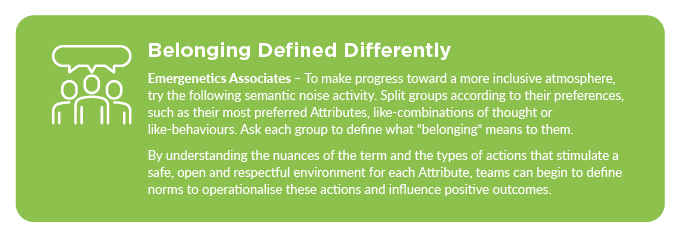
One of the most essential components of a positive, productive company culture has only become a common conversation point in recent years. As you might have guessed, I’m referring to belonging.
In a Qualtrics study, belonging was found to be the top driver of employee engagement, while a survey by BetterUp found that workplace affinity led to a 56% increase in job performance and a 50% decrease in employee turnover risk.
To realise the value of a positive workplace, it’s important to identify and articulate what belonging means within any organization, as there a variety of definitions available to choose from.
The Merriam Webster Dictionary describes it as a:
Close or intimate relationship.
Supportive interpersonal networks are certainly an important aspect to feeling a sense of affinity, and yet, I believe this relational matter is only one piece of the puzzle.
I like this definition from the Cambridge Dictionary, which depicts belonging as:
A feeling of being happy or comfortable as part of a particular group and having a good relationship with the other members of the group because they welcome you and accept you.
In this version, I am particularly drawn to the idea of acceptance. Being happy or comfortable within a group does not necessarily mean the participants will agree in every circumstance or be without conflict. In reality, we all have interactions that may make us feel scratchy at times. To truly feel a sense of belonging, these experiences must include respect for each person so that they may feel comfortable bringing their authentic selves to the workplace.
With so many facets, the question may be asked: How can a welcoming workplace where each employee feels supported and valued be cultivated?
As a starting point, I would encourage leaders and team members to consider what belonging means to different people. One place to begin is to reflect on the meaning of the word through the lens of the Emergenetics® Attributes.
By examining how each Thinking and Behavioural preference may feel a sense of connection and reassurance within a particular space or group of people, organisations can set a foundation on which to build a more inclusive, engaging culture.
Belonging Through the Seven Attributes
 Appreciating Skepticism and Expertise
Appreciating Skepticism and Expertise
The Analytical Attribute can be a natural skeptic, raising questions to understand the reasoning and logic behind something. To strengthen ties to the workplace, individuals with this preference require room to ask questions and trust that they will be evaluated. Analytical thinkers are also likely to feel greater affinity in environments where their expertise and inputs are valued.
 Respecting Roles and Accountability
Respecting Roles and Accountability
Structural thinkers commonly wish to understand the expectations on themselves and others. Having clarity into their role and the contributions they will be making helps them to feel empowered and know they play a vital part. It is also essential that they feel they can depend on the commitments made in order to feel comfortable.
 Cultivating Compassion and Connection
Cultivating Compassion and Connection
Often, when climate descriptors such as belonging are used, the Social Attribute may first come to mind. This Attribute prioritises relationship building and will feel more united when their colleagues demonstrate care for one another. Promoting this type of atmosphere will allow Social thinkers feel a strong bond with their company.
 Being Part of Something Larger than Oneself
Being Part of Something Larger than Oneself
The Conceptual Attribute is energised by having opportunities to align with the bigger picture. To stimulate affinity for someone with a Conceptual preference, it is important to develop an inspiring vision that they may aspire to as well as to establish links between their work and the potential impact it has on the future.
![]() Honouring Voice
Honouring Voice
No matter where a person finds themselves on the Expressiveness spectrum, they still have a desire to be heard. An inclusive climate will ensure that everyone can share their inputs. This means providing pauses to allow those in the first-third of Expressiveness the time and space they need to think and reflect as well as encouraging individuals in the third-third to verbalise what they are thinking.
 Trusting There Is Safety in Honesty
Trusting There Is Safety in Honesty
From the lens of Assertiveness, belonging can be strengthened by creating an environment where individuals feel psychologically safe in advancing their thoughts, feelings and beliefs. This sort of atmosphere will welcome questions and engage in discussion in a calm, measured manner to support those in the first-third, while leaving room for people in the third-third to declare their thoughts directly without judgment.
![]() Exploring Options
Exploring Options
To honour the Flexibility continuum, I recommend being open to discussing new ideas and alternatives as they arise while agreeing to examine why any direction is chosen or changed. Holding strong to commitments and adjusting course only for meaningful reasons will help individuals in the first-third feel secure, and those in the third-third will appreciate having opportunities to raise their new considerations. Fostering belonging means considering what needs to be “tight” and what needs to be “loose”.

A People-first Approach for Sustainability
When I reflect on the different conditions that encourage belonging, I believe that success lies in creating a space that considers the needs and preferences of every person, regardless of title, role, background and more, and that values their individual gifts.
To enhance belonging, I would advocate that leaders prioritise a culture that:
- Allows individuals to be authentic
- Is empathetic to their needs and differences
- Strives to create shared understanding of each person and their interests
When successful in doing so, organisations will experience an extraordinary shift in their climate.
This focus on belonging will go a long way in enhancing employee engagement and overall job performance, and perhaps the biggest benefit of approaching belonging from the lens of the individual is the sustainability of this approach. While large-scale changes can certainly be meaningful, creating a sense of community starts by taking simple actions in our day-to-day work like the decision to treat someone as they want to be treated. Through these seemingly small decisions and acts, individuals will feel more affirmed, teams will be more connected and culture will thrive.
Interested in learning more about how Emergenetics can help you build a more engaging, positive culture? Explore our website or fill out the form below to speak with one of our team members today!
 Print This Post
Print This Post
